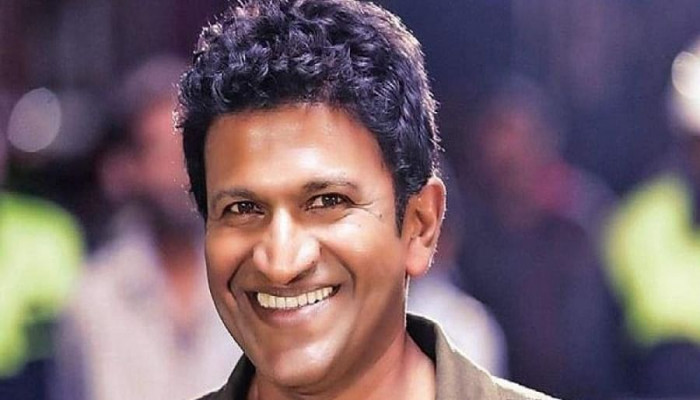Puneeth Rajkumar: A Dharmic legacy for time immemorial
- In Current Affairs
- 07:50 PM, Nov 01, 2021
- Venkataraman Ganesan
“Unable are the loved to die, for love is immortality” – Emily Dickinson
On Friday, the 29th October 2021, India cinema in general and Kannada cinema, in particular experienced a pain akin to a jagged knife being rammed straight and deep into the heart. A veritable darling of the masses and a multifaceted actor in sense of the term, Puneeth Rajkumar (also known by the popular appellations of “Power Star” and “Appu”) suffered a massive cardiac arrest and despite Herculean efforts to revive him, died. He was all of 46. The death of Puneeth Rajkumar sent shockwaves through an entire State and plunged it in an ocean of grief and misery. Even while people were desperately trying, not just, to get to grips with the tragedy, but also wishing that the tragedy of Shakespearean proportions being played out in front of them was a mere dream draped in the garb of reality, his fans decided to honour him in the only way befitting their idol. The superstar’s mortal remains were transferred to the Kanteerava Stadium in Bangalore where it would be displayed in a transparent casket for all to pay their final respects.
They came in droves. They came unmindful of irritating rain and inconvenient timings. They came drenched in tears and racked by agonizing pain. They came from far and near. They came, the young and the old, the aged and the infirm. They didn’t stop coming. The serpentine queue seemed as though it was a painting that would remain etched over a canvas in perpetuity. All for a final glimpse of their beloved hero. They streamed past the casket barely able to steal a wholesome glimpse. For some it was not even a glance. The barricades surrounding the casket were gradually extended and expanded until one could only catch a wee look. Yet undeterred by even this formidable constraint, they kept coming. Close to 30 lakhs walked past the casket in just under 48 hours.
All the while his family grieved. Grieved in a manner that was emblematic of grace and epitome of dignity. With the obtrusive, inescapable and sustained glare of the media firmly fixed upon them, they maintained a bearing that was impeccable and were invested with a poise that was immaculate. Dr. Shiva Rajkumar, a super star in his own right, received celebrities and socialites with the utmost respect. Often breaking down unconsolably besides the casket (he later on told reporters that he had lost a son than a younger brother as he had fond memories of carrying Puneeth around in his arms since he was 13 years younger than him), he managed to compose himself on every occasion. Puneeth’s wife Ashwini and his two daughters, Vandita and Driti were beacons of composure.
By any commonly accepted standards, 28 movies is not a phenomenal number. In fact the count pales into existence when weighed against the number of movies starred in by some of the most popular actors plying their wares today. Dr. Shiva Rajkumar has distinguished himself in more than 122 movies. Puneeth’s contemporary, Sudeep has more than 50 movies to his name. So what makes Puneeth Rajkumar so special? What is the reason behind such a resplendent reputation that this actor has carved out for himself in such a short span of time?
I will not spend much, or rather, any time in dwelling about either the magnificent acting skills of Puneeth nor on his multi-talented personality that has seen him regale his audience in the form of a singer, dancer, and producer. Instead it would be prudent to devote some time and attention to his fully ennobling the four Purusharthas that possess immense civilizational and socio-cultural values. Accumulating fame and fortune fulfilled one of the materialistic canon of the Purusharthas in the form of Artha (“Wealth”). Severing links to celibacy took care of the second materialistic tenet of the four Purusharthas in the form of bowing to “Kama”. However, Puneeth’s more stellar achievement was in the embracing of the remaining two spiritual elements, namely Dharma (“Righteousness”) and Moksha (“Salvation”). The succeeding paragraphs attempt to explain how the actor took upon himself to follow in a sustained manner the paths laid down by Dharma and Moksha.
As is the wont following the departure of any eminent personality, the finely lubricated levers of social media swung into ferocious action, immediately following the departure of “Appu”. Both fact and fiction were grist for the mill. The reactions of the vulturine press ranged from the asinine to the absurd; from the sensational to the silly. From broadcasting insensitive pictures of the actor when he was in an ICU in the hospital – by trumpeting that the channel was the only one to have laid its hands on such exclusive pictures that revealed the last moments of the star – to trailing and stalking his eldest daughter as she made her way from the US to Bangalore, social media made a capital mockery of itself.
But in between such nauseating displays, some astoundingly noble revelations hit the unsuspecting viewers like a ton of bricks. The degree of altruism and the extent of philanthropy that invested the life of Puneeth Rajkumar was mind boggling. The inconspicuous and almost unremarkable manner in which such charitable acts were affected made them extra special. Even his own fraternity members expressed undisguised astonishment and downright bewilderment at the magnitude of Puneeth’s deeds. Dr, Rajkumar, one of the greatest ever legends in the annals of Indian cinema once used a Dharmic metaphor to describe the manner in which one goes about doing social service. “Balagaiyyalli Kottaddhu Edagaiyyige Gotthaagabaradhu” (“What the right hand gives the left ought not to know”) said the great man in Kannada. This quality is frequently attributed to the indomitable warrior Karna, who was a pivotal figure in the Mahabharata and one of mythology’s greatest humanitarians. Puneeth Rajkumar symbolized this attribute by crossing all the ‘T’s and dotting all the ‘I’s. At last count the plethora of orphanages, old age homes, free educational institutions and women’s empowerment schemes sponsored and supported by Puneeth made for a list that was positively jaw dropping.
While the exact number of the schemes sponsored or undertaken have not yet been determined or confirmed with precision, squabbling over numbers would detract from the bigger picture and a moral perspective. Also while fully recognising and acknowledging the fact that Puneeth Rajkumar would neither be the first nor the last exemplar in this regard, it is imperative to assert that every contributor of such ilk be recognised and honoured with the right kind of respect and regard. Perhaps the long winding queue that braved the vagaries of natural elements and the vicissitudes of physiological strain, just to have a fleeting peek at Puneeth as he lay still draped in the Saffron, Green and White (he was accorded full state honours), included a multitude who were direct beneficiaries of the nobility of their fallen star.
Humility and a grounded sense of self were two uncompromising characteristics that endeared Puneet Rajkumar to the elitist and commoner alike. The most common refrain that emerged out of the cacophony of wailing voices was irreplaceable vacuum created by the loss of a man who was self-effacement personified. This homogenous lament was duly attested to by many personal anecdotes and wholehearted testimonies. The roll call includes some of my very good friends who had an opportunity to meet and greet Puneeth during the course of a shooting in Kuala Lumpur. The benevolence and unpretentiousness with which he liberally gave his time and talk to his admirers, putting it mildly, had them poleaxed.
Swami Vivekananda once famously remarked that “With every man, there is an idea; the external man is only the outward manifestation, the mere language of this idea within. When you are born a man, leave some indelible mark behind you”. Puneeth Rajkumar more than just left an indelible mark behind him. Neither his achievements nor his ideas can be elided. At a young age of 46, he has left behind a legacy worthy of emulation. A legacy that places the idea of altruism at its very edifice. A legacy that is rich in content and context. A legacy that is time immemorial.
Sleep well Appu! You are for ETERNITY!
Sirigannadam Gelge! Sirigannadam Baalge!
Image source: The New Indian Express
Disclaimer: The opinions expressed within this article are the personal opinions of the author. MyIndMakers is not responsible for the accuracy, completeness, suitability, or validity of any information on this article. All information is provided on an as-is basis. The information, facts or opinions appearing in the article do not reflect the views of MyindMakers and it does not assume any responsibility or liability for the same.







Comments